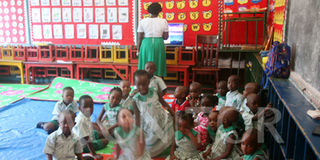Prime
Experts ask govt to take over nursery education

Children attend class at Nakasero Kindergarten in January 2022. PHOTO/JOSEPH KIGGUNDU
What you need to know:
- They say government should address the issue of access to education for all Ugandans at all levels.
Experts have asked the Education Policy Review Commission to consider the integration of the 21st Century life skills and values in the curriculum and assessment of learners at all levels of education.
The experts have also asked government to take over nursery education, which is currently under private investors.
The Ministry of Education formed the Education Policy review Commission composed of 12 experts, who are seeking proposals and views to form the new Education White Paper, 2022 to replace the one that was formulated in 1992.
The ministry is also seeking to change the policies, assessment and curriculum, among other issues.
The director of centre for teaching and learning support at Makerere University, Dr David Kabugo, said the Education review commission should address the issue of access to education for all Ugandans.
He said most learners, especially those in rural areas do not have access to pre-primary education (nursery).
Mr Kabugo said the nursery schools in urban areas are expensive because they are under the private sector.
“Government has ignored the pre-primary sector which has gone un-regulated. The school fees rates are very high and learners are being taught by unskilled teachers. Government should ensure that each primary school has a nursery class because this stage is crucial in the learning outcomes of children, ” he said.
Mr Kabugo also asked the commission to push for compulsory Teachers’ Continuous Professional Development every two years, enabling teachers to stay up-to-date with the emerging technology and way of teaching.
The principal of the College of Education at Makerere University, Prof Anthony Mugagga Muwagga, said the examinations administered do not require learners to think critically.
Prof Mugagga was speaking to Daily Monitor yesterday in an interview after the launch of Adapting assessment into a policy and learning (ADAPT) at Makerere University in Kampala.
He said the learners are given questions based on what they were taught, adding that they cram the notes and reproduce them to pass exams.
“Learners in the 21st Century should be able to identify and solve problems, be critical thinkers and should be able to use the emerging technologies to innovate solutions. At a moment, these are lacking,” Prof Mugagga said.
“Even in science practicals, learners are taught how to mix chemicals as opposed to teaching them what type of medicine they can get from mixing chemicals,” he added.
Prof Mugagga said the curriculum should be reviewed to incorporate skills, so that learners are equipped from the grassroots.
Mr Samuel Otieno, a lead researcher at GESCI organisation and East Africa, said Kenya, Rwanda, and Uganda should undergo education reforms, use the available data and research to change their education system.
He said the countries should not ignore changing the curriculum for teacher trainees because these determine what type of content they impart to learners.
Hasadu Kirabira, a school proprietor, asked the Education Policy Review Commission to consider the issues of research and proper planning, human resource development, and adopting ICT in the teaching and learning system.
Background
The Minister of Education and Sports, Ms Janet Museveni, last year formed a 14-member Education Policy Review Commission to overhaul the entire education system.
The Commission is headed by the former Opposition Forum for Democratic Change founder, Mr Amanya Mushega, and deputised by Mr Joseph Muvawala, the executive director of the National Planning Authority.
The commission has been seeking proposals and views from the general public, education experts, civil society organisations and Members of Parliament.
These are supposed to write a report from the proposals and present it to Ms Museveni, who will in return present it to Cabinet for approval to form the 2022 Education White paper to replace the current one which was formed in 1992.
Other committee members include John M. Nasasira, Prof John David Kabasa, Prosperous Nankindu, Jacklyn Makaaru, Yusuf Nsubuga, Kedrace Turyagyenda, Monica Monge Abenakyo, Ms Irene Nanfuka Rusoke, Clarence Olongamuri, and Brighton Barugahare.
READ MORE:




